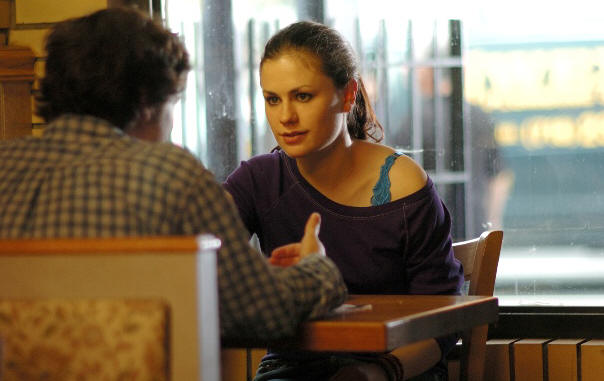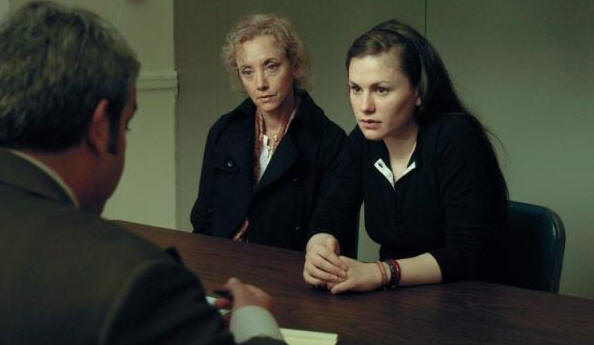MOVIE REVIEWS |
INTERVIEWS |
YOUTUBE |
NEWS
|
EDITORIALS | EVENTS |
AUDIO |
ESSAYS |
ARCHIVES |
CONTACT
|
PHOTOS |
COMING SOON|
EXAMINER.COM FILM ARTICLES
||HOME


Saturday, February 18, 2012
MOVIE REVIEW
Margaret
New York City: An Operatic Stage Where Drama & Theater Are Born And Idealism &
Innocence Die

Anna Paquin as Lisa Cohen in "Margaret", Kenneth Lonergan's epic moral drama.
Myles Aronowitz/Fox Searchlight
by
Omar P.L. Moore/PopcornReel.com
 FOLLOW
FOLLOW
Saturday,
February 18,
2012
There's a moment midway through Kenneth Lonergan's epic drama "Margaret" where
his "You Can Count On Me" star Matthew Broderick reads Gerard Manley Hopkins'
19th century poem "Spring And Fall: To A Young Child" to his high school class.
The poem symbolizes the inevitable clash between innocence and adulthood, one of
the central themes of Mr. Lonergan's excellent film. Margaret is the young
child that Mr. Hopkins, who died at 45, mentions in his poem. In the film
17-year-old Lisa Cohen (Anna Paquin) is Margaret's contemporary stand-in.
Or contemporary enough. In "Margaret" it is New York City, 2005. ("Flightplan"
and "Roll Bounce", released that year, are the titles on a movie theater
marquee.) The specter of the World Trade Center attacks are still
very fresh in the Big Apple air. Lisa lives with her divorced mother Joan (J.
Smith-Cameron) and younger brother on Manhattan's Upper West side, in relative
comfort and privilege. An acerbic, angry and shrewd, razor-sharp teen,
Lisa has the courage of her convictions, challenging everything she hears to
exactitude in a discursive manner, a perfectionist trying to hit every note,
leaving no stone unturned, much like Mr. Lonergan himself. (Every
recognizable actor in the film looks, well, obviously younger.)
Lisa gets a city bus driver's attention. Her distractions contribute to a
tragedy. Lisa lies about the circumstances surrounding the tragedy but
guilt and nightmares have her change course. In between the two crucial
episodes Lisa crosses the line with one of her private school teachers, debates
a classmate repeatedly about 9/11/01, Jews, Muslims and Palestine, tenaciously
seeks punishment for the bus driver's role in the tragedy and has the tense
relationship with her mother you'd expect for a girl Lisa's age, predating
though not unlike the tormented relationship between Natalie Portman and Barbara
Hershey in
"Black Swan".
Aside from the significant cast of players (including the director's wife Ms.
Smith-Cameron and his good friend Mr. Broderick) "Margaret", a perfectly crafted
film for the stage, is the big stage. The onscreen audience --
the array of faces we see at the very start and throughout -- is a character in
and of itself, as is New York City, which is the larger, giant stage Lisa's
drama plays out on. The events of Mr. Lonergan's film are theatrical, more
so even than the physical settings of theater, notably New York's Metropolitan
Opera House, whose stage cleverly comes full circle in verisimilitude in the
film's climax.
Ever the stage man, Mr. Lonergan crafts fantastic, crackling dialogue that is
purely theatrical, with deliberate overreactions and quick-tempered dynamite.
As acted by a great cast "Margaret" comes alive with a cacophony of sound,
interruption, observation, telephone calls, information, note-taking and address
and phone-number writing, Hawksian cross-talk and spontaneous, argumentative
banter. "Margaret" boasts Lisa, a teen undergoing physical and
psychological changes but seemingly fighting off adulthood with her powerful,
single-minded sense of idealism. Lisa barges rudely into the world of
adults and their affairs rather than makes her own passage into adulthood.
In some ways Lisa is phenomenally naïve, in others calculating, in still others
a strong, justice-minded woman who despises immorality even as she partakes in
some risky behavior herself.
There are two distinct languages spoken in "Margaret": one of precision, mainly
spoken by men, all of whom in this film have decisive, direction-oriented
professions -- attorney, bus driver, teacher, police detective. The second
language is one of inexactness, mainly spoken by women, all of whom in the film
have professions or occupations that are about exploring, expressing and
questioning things -- stage actress, high school student. Women
continuously question men, who dogmatically explain their stances on things,
almost always engaging in absolutes and certainties, which doesn't necessarily
leave them on comfortable moral footing.
"Margaret", which flaunts moments of comedy amidst tension, is a rigorous study
of linguistics and verbal cadences. People are constantly explaining
extemporaneously, articulating views that are shrill but also eloquent even if
sometimes inexact and often impatient. One teacher's exactitude and
absolutism gets the better of him when his student interprets Shakespeare; the
teacher is so busy being an authoritarian adult he forgets that people are
entitled to their own interpretation of Shakespeare regardless of original
meaning. This continuous sparring between adults and children breeds a
tension and a larger lesson about might making right, about rules being made up
as people go along, about a child being wrong in an adult's world: wrong to
question, wrong to assert, wrong to interrupt. A police officer dismisses
the incisive Lisa as "honey". The moral center in some of the adults,
especially some of the male authority figures, is polluted.

J. Smith-Cameron (left) as Joan and Anna Paquin as Lisa in Kenneth Lonergan's
"Margaret". Myles
Aronowitz/Fox Searchlight
As for the film's technical aspects are there editing problems? Yes.
Does the film jump and meander with mismatched shots at times? Are some of
the points and themes repetitive? Yes, but the director allows key
dialogue sequences to breathe. The film's faded, muted 1970s quality works
and there's a dream-like feel to it. In one scene the title of one of a
group of books behind a character reads, "Removal From Reality", which perhaps
signals or is a comment on Lisa's ill-fitting place in an adult world.
Lisa seeks an education but experiences one in the nuts and bolts of real life
and not in the artificial stage of the classroom. She challenges the
hypocrisy in adults but at what cost?
What Mr. Lonergan has in "Margaret" is a diamond in the rough, gleaming with
talkative brilliance and smeared with complexity and moral conundrums, as well
as endlessly competing soundtracks. Ambient noise is a resonant, effective
part of "Margaret", which totally immerses itself in its surroundings, taking
note of everything around it. Even some of the mismatched shots are happy
accidents; notably the idea that any potential building overlooking, or ship
passing by on the Hudson River, is a figurative captive audience to Lisa's
imbroglio. The film and its director are keenly aware of its built-in
grand audience of New York City. They are not background noise, and in
various overhead shots from skyscrapers a larger audience presides over Lisa,
who is dwarfed by a world of vituperative adults.
Feeling squeezed, Lisa seeks purity in an impure world, yet when things become
too personal she behaves in an adult way. Lisa is refreshingly honest, to
a fault even, but all she wants is to make sense of the unease and emotional
turmoil boiling within her. Lisa's father, played by Mr. Lonergan, is,
aside from one teacher, the only person who has a calming effect on her.
Joan however, upsets Lisa more with every word she speaks. As an
award-winning stage actress, Joan, who stars in a stage play appropriately
titled "Controversy", has natural theatrics, bringing her real domestic dramas
in her play's character on stage to the film's onscreen audience.
As Lisa Ms. Paquin does the best work of her career -- and this, again, was
filmed almost seven years ago. She wields a certitude that's commanding,
giving Lisa a fierce backbone and expressive power. Ms. Smith-Cameron is
excellent as Lisa's frustrated and anguished mother Joan, who has an amorous
relationship that faces awkward situations. Lisa and Joan are beings on a
collision course. They are mirror images and polar opposites, and
"Margaret" chronicles their meeting in the middle, so exquisitely rendered late
on. Both are inner children in rapidly-changing bodies, varied by age and
experimentation but are more alike and have more in common than they even admit.
At times surreal, spiritual and haunting, "Margaret" has an occasionally creepy
atmosphere and Hitchcockian doubling. At least two characters have the
same first name, including a deceased daughter of one character who shares
Lisa's name. Lisa's classmate Monica shares her name with another key
character, and there's an eerie likeness between them, just as the similarities
in the stunning if not unsettling doppelgangers on the opera stage.
The film's editing process, which took almost six years, was tortured with
lawsuits and various disagreements. "Margaret" was supposed to be three
hours long as per the director but after much dissatisfaction about various
iterations of the finished product over the years Mr. Lonergan eventually agreed
on a final cut after Martin Scorsese and his long-time editor Thelma Schoonmaker
edited a 150-minute version Mr. Lonergan approved of.
If one looks at the arrhythmic editing as a representation of the events and
perceptions as seen from the view and in the mind of a confused,
constantly-changing and ethical teen, then "Margaret" becomes even more
masterful than Mr. Lonergan may have intended. In this marvelous, flawed
but remarkable adult
"Pan's Labyrinth"-type fairy tale all the Big
Apple's a stage, and like Mr. Hopkins says in his poem, we grieve and despair
for Margaret. She's still a Toys R Us kid in an FAO Schwartz and Apple
world.
With: Jeannie Berlin, Mark Ruffalo, Jean Reno, Stephen Adly Guirgis, Olivia
Thirlby, Sarah Steele, John Gallagher Jr., Hina Abdullah, Kieran Culkin, Matt
Damon, Allison Janney, Michael Ealy, Jake O'Connor, Jerry Matz, David Mazzucchi,
Enid Graham, Renée Fleming, Susan Graham.
"Margaret" is rated R by the Motion Picture Association Of America for
strong language, sexuality, some drug use and disturbing images. The film's running
time is two hours and 30 minutes.
COPYRIGHT 2012. POPCORNREEL.COM. ALL RIGHTS RESERVED.  FOLLOW
FOLLOW
MOVIE REVIEWS |
INTERVIEWS |
YOUTUBE |
NEWS
|
EDITORIALS | EVENTS |
AUDIO |
ESSAYS |
ARCHIVES |
CONTACT
| PHOTOS |
COMING SOON|
EXAMINER.COM FILM ARTICLES
||HOME


 FOLLOW
TWEET
FOLLOW
TWEET
 FOLLOW
FOLLOW